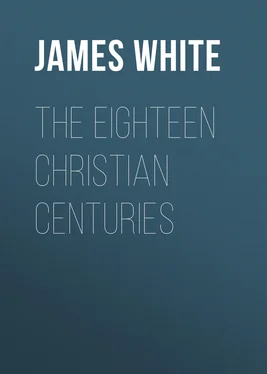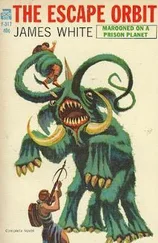James White - The Eighteen Christian Centuries
Здесь есть возможность читать онлайн «James White - The Eighteen Christian Centuries» — ознакомительный отрывок электронной книги совершенно бесплатно, а после прочтения отрывка купить полную версию. В некоторых случаях можно слушать аудио, скачать через торрент в формате fb2 и присутствует краткое содержание. Жанр: foreign_prose, История, foreign_edu, foreign_antique, на английском языке. Описание произведения, (предисловие) а так же отзывы посетителей доступны на портале библиотеки ЛибКат.
- Название:The Eighteen Christian Centuries
- Автор:
- Жанр:
- Год:неизвестен
- ISBN:нет данных
- Рейтинг книги:4 / 5. Голосов: 1
-
Избранное:Добавить в избранное
- Отзывы:
-
Ваша оценка:
- 80
- 1
- 2
- 3
- 4
- 5
The Eighteen Christian Centuries: краткое содержание, описание и аннотация
Предлагаем к чтению аннотацию, описание, краткое содержание или предисловие (зависит от того, что написал сам автор книги «The Eighteen Christian Centuries»). Если вы не нашли необходимую информацию о книге — напишите в комментариях, мы постараемся отыскать её.
The Eighteen Christian Centuries — читать онлайн ознакомительный отрывок
Ниже представлен текст книги, разбитый по страницам. Система сохранения места последней прочитанной страницы, позволяет с удобством читать онлайн бесплатно книгу «The Eighteen Christian Centuries», без необходимости каждый раз заново искать на чём Вы остановились. Поставьте закладку, и сможете в любой момент перейти на страницу, на которой закончили чтение.
Интервал:
Закладка:
Taking our stand at the beginning of our era, there are only eighteen centuries with which we have to do, and how easily any of us get acquainted with the features and expression of eighteen of our friends! Not that we know every particular of their birth and education, or can enter into the minute parts of their character and feelings; but we soon know enough of them to distinguish them from each other. We soon can say of which of the eighteen such or such an action or opinion is characteristic. We shall not mistake the bold deed or eloquent statement of one as proceeding from another.
“Boastful and rough, your first son is a squire.
The next a tradesman, meek, and much a liar:
Tom struts a soldier, open, bold, and brave:
Will sneaks a scrivener, an exceeding knave.
Is he a churchman? then he’s fond of power:
A Quaker? sly: a Presbyterian? sour:
A smart free-thinker? all things in an hour.”
Now, though it is impossible to put the characteristics of a whole century into such terse and powerful language as this, it cannot be doubted that each century, or considerable period, has its prevailing Thought,—a thought which it works out in almost all the ramifications of its course; which it receives from its predecessor in a totally different shape, and passes on to its successor in a still more altered form. Else why do we find the faith of one generation the ridicule and laughing-stock of the next? How did knighthood rise into the heroic regions of chivalry, and then sink in a succeeding period into the domain of burlesque? How did aristocracy in one age concentrate into kingship in another? And in a third, how did the golden ring of sovereignty lose its controlling power, and republics take their rise? How did the reverence of Europe settle at one time on the sword of Edward the Third, and at another on the periwig of Louis the Fourteenth? These and similar inquiries will lead us to the real principles and motive forces of a particular age, as they distinguished it from other ages. We shall label the centuries, as it were, with their characteristic marks, and know where to look for thoughts and incidents of a particular class and type.
Let us look at the first century.
Throughout the civilized world there is nothing but Rome. Under whatever form of government—under consuls, or triumvirs, or dictators—that wonderful city was mistress of the globe. Her internal dissensions had not weakened her power. While her streets were running with the blood of her citizens, her eagles were flying triumphant in Farther Asia and on the Rhine. Her old constitution had finally died off almost without a blow, and unconsciously the people, still talking of Cato and Brutus, became accustomed to the yoke. For seven-and-twenty years they had seen all the power of the state concentrated in one man; but the names of the offices of which their ancestors had been so proud were retained; and when Octavius, the nephew of the conqueror Julius Cæsar, placed himself above the law, it was only by uniting in his own person all the authority which the law had created. He was consul, tribune, prætor, pontifex, imperator,—whatever denomination conferred dignity and power; and by the legal exercise of all these trusts he had no rival and no check. He was finally presented by the senate with the lofty title of Augustus, which henceforth had a mysterious significance as the seal of imperial greatness, and his commands were obeyed without a murmur from the Tigris to the Tyne. But whilst in the enjoyment of this pre-eminence, the Roman emperor was unconscious that in a village of Judea, in the lowest rank of life, among the most contemned tribe of his dominions, his Master was born.
|A.D. 1.|
By this event the whole current of the world’s history was changed. The great became small and the small great. Rome itself ceased to be the capital of the world, for men’s eyes and hearts, when the wonderful story came to be known, were turned to Jerusalem. From her, commissioned emissaries were to proceed with greater powers than those of Roman prætors or governors. From her gates went forth Peter and John to preach the gospel. Down her steep streets rode Paul and his companions, breathing anger against the Church, and ere they reached Damascus, behold, the eyes of the persecutor are blinded with lightning, and his understanding illuminated with the same flash; and henceforth he proceeds, in lowliness and humility, to convey to others the glad tidings that had been revealed to himself. Away in all directions, but all radiating from Jerusalem, travelled the messengers of the amazing dispensation. Everywhere—in all centuries—in all regions, we shall encounter the results of their ministry; and as we watch the swelling of the mighty tide, first of Christian faith and then of priestly ambition, which overspread the fairest portions of the globe, we shall wonder more and more at the apparent powerlessness of its source, and at the vast effects for good and evil which it has produced upon mankind.
What were they doing at Rome during the thirty-three years of our Saviour’s sojourn upon earth? For the first fourteen of them Augustus was gathering round him the wits, and poets, and sages, who have made his reign immortal.
|A.D. 14.|
After that date his successor, Tiberius, built up by stealthy and slow degrees the most dreadful tyranny the world had ever seen,—a tyranny the results of which lasted long after the founders of it had expired. For from this period mankind had nothing to hope but from the bounty of the emperor. It is humiliating to reflect that the history of the world for so long a period consists of the deeds and dispositions of the successive rulers of Rome. All men, wherever their country, or whatever their position, were dependent, in greater or less degree, for their happiness or misery on the good or bad temper of an individual man. If he was cruel, as so many of them were, he filled the patricians of Rome with fear, and terrified the distant inhabitants of Thrace or Gaul. His benevolence, on the other hand, was felt at the extremities of the earth. No wonder that every one was on the watch for the first glimpse of a new emperor’s character and disposition. What rejoicings in Italy and Greece and Africa, and all through Europe, when a trait of goodness was reported! and what a sinking of the heart when the old story was renewed, and a monster of cruelty succeeded to a monster of deceit! For the fearfullest thing in all the descriptions of Tiberius is the duplicity of his behaviour. He withdrew to an island in the sunniest part of the Mediterranean, and covered it with gorgeous buildings, and supplied it with all the implements of luxury and enjoyment. From this magnificent retirement he uttered a whisper, or made a motion with his hand, which displaced an Eastern monarch from his throne, or doomed a senator to death. He was never seen. He lived in the dreadful privacy of some fabled deity, and was only felt at the farthest ends of his empire by the unhappiness he occasioned; by his murders, and imprisonments, and every species of suffering, men’s hearts and minds were bowed down beneath this invisible and irresistible oppressor. Self-respect was at an end, and liberty was not even wished for. The emperor had swallowed up the empire, and there was no authority or influence beside. This is the main feature of the first or Imperial Century, that, wherever we look, we see but one,—one gorged and bloated brutalized man, sitting on the throne of earthly power, and all the rest of mankind at his feet.
|A.D. 37.|
Humanity at its flower had culminated into a Tiberius; and when at last he was slain, and the world began to breathe, the sorrow was speedily deeper than before, for it was found that the Imperial tree had blossomed again, and that its fruit was a Caligula.
Читать дальшеИнтервал:
Закладка:
Похожие книги на «The Eighteen Christian Centuries»
Представляем Вашему вниманию похожие книги на «The Eighteen Christian Centuries» списком для выбора. Мы отобрали схожую по названию и смыслу литературу в надежде предоставить читателям больше вариантов отыскать новые, интересные, ещё непрочитанные произведения.
Обсуждение, отзывы о книге «The Eighteen Christian Centuries» и просто собственные мнения читателей. Оставьте ваши комментарии, напишите, что Вы думаете о произведении, его смысле или главных героях. Укажите что конкретно понравилось, а что нет, и почему Вы так считаете.












